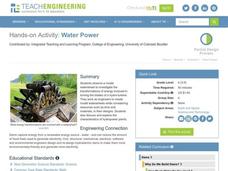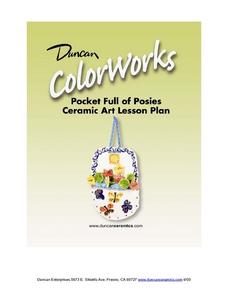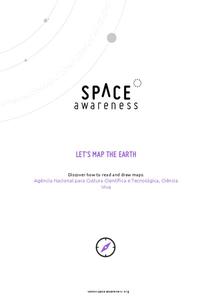National Science Teachers Association
Hop into Action
Young scientists find out what makes amphibians such unique and interesting animals in this simple life science lesson. After looking at pictures and discussing the characteristics of amphibians, learners complete a series of three Venn...
PBS
Blow the Roof Off!
Blow the minds of young scientists with this collection of inquiry-based investigations. Based on a series of eight videos, these "hands-on, minds-on" science lessons engage young learners in exploring a wide range of topics from making...
Curated OER
Circle of Life
Here is a well-designed science lesson that shows learners that everything that organisms do in ecosystems, including running, breathing, burrowing, growing, requires energy. After a thorough discussion of their own eating and drinking...
Science Matters
Blubber Gloves: It’s All About Insulation
Instill the concept of adaptation with the help of Blubber Gloves—ziplock bags, shortening, and duct tape. Scholars discuss how animals and plants keep warm in polar regions, record their predictions, and try on their Blubber Gloves to...
Institute of Electrical and Electronics Engineers
Life Vest Challenge
After reading about the history and science of personal floatation devices, patents, and intellectual property, engineering teams design a life vest for a can of soup. To evaluate which groups considered the need for waterproofing, hold...
NOAA
Sustaining Our Ocean Resources
Lead young scientists on an investigation of fishery practices with the final installment of this four-part unit. Using a PowerPoint presentation and hands-on simulation, this activity engages children in learning how fish populations...
Institute of Electrical and Electronics Engineers
Waterproof that Roof!
Stop the raindrops from getting into the house! Eager engineers learn about roofing history and waterproofing by nanotechnology. They get into groups and work on designing a waterproof roof for a small model house. The accompanying...
Science Matters
Island Fox Outreach
Off the coast of California lives a wild animal called the Island Fox. Experts discuss the importance of the Island Fox to the Channel Islands and the balance the fox creates within its ecosystem. The lesson concludes with a reading of...
Curated OER
The Marvels of Mud
Young scientists roll up their sleeves and get a little dirty in this three-day earth science investigation. Following the scientific method, children monitor the growth of algae in pond water samples in order to determine the role that...
Science Matters
Crawly Composters
Get your hands dirty with an interactive lesson that showcases the process of decomposing and returning nutrients back into the soil. After building a compost pile, pupils regularly observe the ways worms help with changes to the soil...
Curated OER
Cycles and Starting Mealworms
Here is a fascinating lesson about the life cycles of plants and animals, and other cycles found in nature. Learners explore the cycle of the moon, the tides, and other sequences of events in every day life. The big activity is the...
Curated OER
Insects A-Z!
Alphabet insects! Who has ever heard of such a thing? Get ready because your class is going to research insects that start with a specific letter of the alphabet. In small groups, they'll use the Internet and reference texts to locate...
Science Matters
Mighty Microorganisms
How can you tell if a microorganism is helpful or detrimental to an ecosystem? Learners inspect slides or pictures of microorganisms and record their observations to identify those that are beneficial or harmful. They then pretend to...
Science Matters
Oh Heron
Two teams—the environmentalists and herons—play four rounds of the game, Oh Heron. Using hand symbols to represent food, shelter, and water, players locate their match to produce more herons while those unmatched decompose.
Teach Engineering
Water Power
Young hydrologists observe a waterwheel which helps them investigate the transformations of energy that occur when the blades of a hydro-turbine are turning. They work together in pairs and pretend to be engineers who are building a new...
Curated OER
Pocket Full of Posies: Ceramics
After studying the plant or flower life cycle, have the class create a basket of flowers out of clay. They hone their ceramics skills while they push, pull, then paint clay to look like flowers they've seen in nature. There are several...
Science Matters
Plot Study
Small groups investigate plots of land to discover how abiotic and biotic factors interact. After recording their findings, scholars share observations with peers and self-reflect on the learning process.
Science Matters
Lotusland
It's time for a field trip! Scholars take their new-found knowledge of adaptations and seed dispersal on a field trip to a local botanical garden. They gain an up-close look at how ecological interdependence works in a distinct...
Curated OER
The Chesapeake Bay in Captain John Smith's Time
When Captain John Smith visited the Chesapeake Bay in the summer of 1608, what types of animals and habitats did he encounter? Your young historians will analyze primary source documents to answer this question, as well as compare the...
Space Awareness
Water is a Heat Sink
One of the key objectives of Europe's Copernicus Earth program is to monitor the temperatures of the oceans and seas on Earth. Young scholars learn the effects of different heat capacities through two experiments. These experiments...
Space Awareness
History of the Universe
Your pupils may believe that you and their parents are the oldest things in the universe, but surprise! There are elements of the universe that are even older. Elementary scientists create a class timeline to demonstrate the expansive...
Space Awareness
The Big Meltdown
Explore the world (our world) of melting ice caps. Why are these caps melting? What is the effect of melting ice caps? Dive into the ever-present issue of global warming with a resource that has learners looking at data and participating...
Space Awareness
Let's Map the Earth
Before maps went mobile, people actually had to learn how to read maps. Pupils look at map elements in order to understand how to read them and locate specific locations. Finally, young cartographers discover how to make aerial maps.
Space Awareness
Meet Our Neighbors: Sun
The sun isn't just a ball of yellow! Young scientists learn about the features of the sun using a hands-on modeling activity. They build models of the sun using common household items to represent sunspots, solar prominence, and the...
























